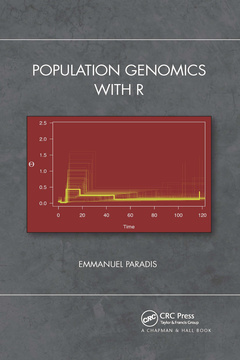Description
Population Genomics with R
Author: Paradis Emmanuel
Language: English
Subjects for Population Genomics with R:
Keywords
Ind1 Ind2 Ind3 Ind4 Ind5; NA NA NA NA; Haplotypes; NA NA NA NA NA; Coalescence; NA NA NA; high-throughput sequencing; L1 L2 L3; linkage disequilibrium; Spatial Principal Component Analysis; natural selection; Align DNA Sequence; population structure; BAM File; NA NA; Reference Genomes; FALSE FALSE; Population Genomic; Population Genomics; FALSE TRUE TRUE FALSE; HTS Technology; Coalescent Tree; Standard PCA; Coalescent Times; AMOVA Test; DNA Molecule; Marbled Crayfish; Biallelic Loci; Bed File; SNP Locus; MCMC Simulation
Publication date: 06-2022
Support: Print on demand
Publication date: 05-2020
· 15.6x23.4 cm · Hardback
Description
/li>Contents
/li>Biography
/li>
Population Genomics With R presents a multidisciplinary approach to the analysis of population genomics. The methods treated cover a large number of topics from traditional population genetics to large-scale genomics with high-throughput sequencing data. Several dozen R packages are examined and integrated to provide a coherent software environment with a wide range of computational, statistical, and graphical tools. Small examples are used to illustrate the basics and published data are used as case studies. Readers are expected to have a basic knowledge of biology, genetics, and statistical inference methods. Graduate students and post-doctorate researchers will find resources to analyze their population genetic and genomic data as well as help them design new studies.
The first four chapters review the basics of population genomics, data acquisition, and the use of R to store and manipulate genomic data. Chapter 5 treats the exploration of genomic data, an important issue when analysing large data sets. The other five chapters cover linkage disequilibrium, population genomic structure, geographical structure, past demographic events, and natural selection. These chapters include supervised and unsupervised methods, admixture analysis, an in-depth treatment of multivariate methods, and advice on how to handle GIS data. The analysis of natural selection, a traditional issue in evolutionary biology, has known a revival with modern population genomic data. All chapters include exercises. Supplemental materials are available on-line (http://ape-package.ird.fr/PGR.html).
1. Introduction. 2. Data Acquisition. 3. Genomic Data in R. 4. Data Manipulation. 5. Data Exploration and Summaries. 6. Linkage Disequilibrium and Haplotype Structure. 7. Population Genetic Structure. 8. Geographical Structure. 9. Past Demographic Events. 10. Natural Selection.
Emmanuel Paradis is senior researcher in the French Institute of Research for Development (IRD). His research focuses on evolutionary models and their applications. The development and publication of software associated to his research has been an important aspect of his activities for more than twenty years. He adopted R as his main software for data analysis in 2000 and has since published and maintained several packages, including ape since 2002 and pegas since 2009. He gives regular workshops and trainings in several countries.




